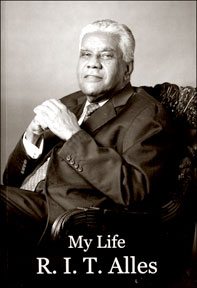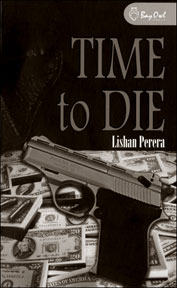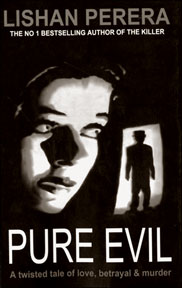
Success story of an educator
The book - 'R.I.T. Alles - My Life' was launched on October 3, 2007
by Bogoda Premaaratne
 In January 1967, I had a request from the Ministry of Education to
nominate a young teacher of mine to begin a new school at Gregory's Road
and build it up on the lines of Royal College of which I was the
Principal. In January 1967, I had a request from the Ministry of Education to
nominate a young teacher of mine to begin a new school at Gregory's Road
and build it up on the lines of Royal College of which I was the
Principal.
This request was a daunting challenge because it came from a "No
nonsense and no questions to be asked", man, the then Minister of
Education, the Honourable I. M. R. A. Iriyagolla.
As the proposed school was going to be a primary school at the
outset, naturally, I scouted for one in my fold of trained teachers. Mr.
Alles was one of four teachers who came to my aid, voluntarily to teach
mathematics, physics, chemistry and biology in the O'L classes for the
first time in the Swabasha at Royal College in 1965.
Mathematics was allocated to Mr. Alles and in the years 1965 and
1966. He as one of the four teachers mentioned who produced in a near
100% distinctions and credits in their respective subjects.
Additionally Mr. Alles during these years was instrumental in
bringing to Royal the plums De Zoysa Challenge, and the Herman Loos
Challenge trophies in Cadeting, the John Tarbet trophy in athletics and
the under-16 cricket championship.
In community work Mr. Alles stood out as the much accepted secretary
of the Teachers Guild whose members acknowledged him as one who promoted
the welfare activities of its members.
With these attributes of academic achievements both in and out of
school and his personal relations with the members of the tutorial
staff, I had no hesitation whatsoever to nominate Mr. Alles at the age
of 34 to be the Founder Principal of D. S. Senanayake College.
R. I. T. A. (R.I.T. Alles) as I always endearingly refer to him never
let me down from the very first day he took up the onerous task from the
10th of February 1967. I enjoyed reflected glory and plaudits for
nominating him. In my heart he became my pride.
D. S. Senanayake school was started in Colombo on a site referred to
as "Koombi Kelle". With all the arduous tasks ahead of him he never let
me, the maths students of the G.C.E. O/L classes and the cadets, down.
He made it a point to have afternoon classes for the maths students
who were sitting for the G.C.E. O/L examination in December, and also
continued with the practices for the cadets who were getting ready to go
to camp in April.
Such were the sacrifices R. I. T. A. made and the maths students and
the cadets of Royal reciprocated with love in clearing the viper
infested jungle in Gregory's Road. On my part 1 supplied him with every
bit of stationary and even sacrificed my watcher, Danny for his
security, which I did with relish.
One thing that gladdened my heart most about Mr. Alles's style of
professional approach to educational discipline and management was the
quality of his interpersonal relationships that he maintained with the
parents, teachers and foremost with the students of the school. His
school, for the most part came up out of the good-will of the parents.
He had no old boys to help, at that time. For the first time I heard
a principal who could address all his students as "putha" and "puthala".
There really was no need for Mr. Alles to have written his life story
on perishable paper; for the quality of his character as teacher and
educator that he has indelibly inscribed deep within the hearts and
minds of so many young people, will be passed on from generation to
generation without his knowing it, and even their knowing it.
This is a psychological truth of which teachers and even parents are
unfortunately not aware of.
I wish Mr. Alles many more years of benevolent service to our
fellowmen.
From the dark side to the limelight
 Child prodigy Lishan Perera released his premier novel, The Killer in
December 2006. Now, more than an year later he has come up with two more
horror stories - "Pure Evil" and "Time to Die". He steps into Writer's
Den today for a brief chat. Child prodigy Lishan Perera released his premier novel, The Killer in
December 2006. Now, more than an year later he has come up with two more
horror stories - "Pure Evil" and "Time to Die". He steps into Writer's
Den today for a brief chat.
The Killer, Pure Evil and Time to Die are the kind of books that run
cold shivers down your spine. Why did you pick on the genre of horror?
Actually my novels are more of the thriller genre than of the horror
genre. It just happens my stories have a lot of horror and violence
mixed into the plot. I guess the reason for this is because I read a lot
of thrillers and crime novels by authors such as James Patterson,
Jonathan Kellerman, Chris Ryan, and as a result tend to write about what
I know and like. I also think that many teens today enjoy fast, gripping
reads, full of action, sudden twists, climatic endings and suspense.
Do you intend to write only horror books in the future too?
No, as I grow up I plan to write on a wide variety of themes and
events, rather than just continue on the same track. However, presently,
since I'm just building my foundation and establishing myself as an
author, I've been concentrating on writing about topics I'm more
comfortable with, i.e. crime, suspense and horror.
Why do you set the scenes in America? Wouldn't a Sri Lankan setting
have made things more familiar for your local readers?
 A lot of people ask me the same question: Why not set your scenes in
Sri Lanka? Well, I guess the main reason for this is because somehow an
American backdrop seems more suitable for the type of books I write. A lot of people ask me the same question: Why not set your scenes in
Sri Lanka? Well, I guess the main reason for this is because somehow an
American backdrop seems more suitable for the type of books I write.
For instance, in Time to Die, you have a professional, deadly
contract killer as well as a crazed psychopath ... both equally
dangerous though different in many ways. . And I think you need a giant,
bustling city, full of crime and corruption, take New York for example,
with a capable, advanced Police Force, like the NYPD, to make the story
seem realistic. Also, a lot of kids today will find it easier to
associate the stuff I write about with the US rather than Sri Lanka.
Who are your favourite authors?
James Patterson, Jonathan Kellerman, Sydney Sheldon, R L Stine, J K
Rowling, Jeffery Archer and Anthony Horowitz to name a few... There is
just something about their work which makes it stand out from the all
the other books I read.
And I guess in a way, it is these authors who inspired me, through
their masterpieces, to actually sit down and start writing.
How do you find the time to write? How long does it take to complete
a story?
Since I'm a student at CIS (in year 9), juggling my writing and
studies gets quite complicated at times. I really don't sit down at a
specific hour and say, "Look, I'm going to write now!" simply because I
don't always have the time.
However, being an author is serious business, and you have to be
disciplined. I try to sit down in front of the computer and write a
minimum of five pages a day, and somehow this task has more or less
become routine.
If I have any more time left after that, I do a bit of research (for
the story) or rewrite a scene I'm not too satisfied about.
The Killer, which was my first book took about two months. (Time to
Die, which is 300 odd pages) took around half a year. After that I was
so exhausted that I decided on a slightly shorter, simpler novel, which
didn't require so much effort or research.
As a result, Pure Evil was born, and this took about a month and a
half to write. Right now, I'm working on another long, very serious
project titled The Dark Half. I don't want to give out the plot so
early, so I wont talk much about it.
However, since I've just started writing this twisted whodunit, I
will say that it'll take at least another six to seven months to
complete. With luck, it should be out in about February!
You have dedicated all your books to your uncle. Tell us more about
him.
My uncle, Senaka Alles, was forty six years when he died of a sudden
heart attack in March 2007. In addition to my parents, he gave me a lot
of inspiration and support and always encouraged me to write. He was one
person who always believed in me.
He was also widely read, and so helped me with many of the actual
facts and real life events (e.g. the working of the NYPD) which I
included in my novels. He was my only uncle and I will always miss
him...
Do you see yourself as an ordinary teenager or as someone
exceptional?
Um (if I am to be rather modest!) I guess I see myself as a slightly
exceptional teen, for no other reason than the fact that I was born with
such a wonderful gift ... the ability to make and write stories to
entertain others. Right now, I don't know what the future has in store
for me, but I do know that no matter what I do or where I go, I'll
always continue writing.
Writer's Den wishes him all the best.
Aditha
The invisible guest
by Tissa Devendra
Leafing through my father's collection of old journals I came across
the Tenth Anniversary Number [May 1941] of "Young Ceylon" which modestly
called itself 'The Most Popular Monthly Magazine in Ceylon'.
My father D. T. Devendra had written an amusing piece on a Victorian
newspaper the "Colombo Observer and Commercial Advertiser" of November
25th 1847 . Most interesting is the "Caution" by John Van Twest in which
he announces "For reasons concerned to myself have mutually separated
from my wife from bed and board."
Having been recently involved in the Salaries Commission I realised
the perennial nature of the problems we had struggled with when I read
the Editor on the "Indebtedness of Clerks". He writes "This question has
come up for consideration once again.
It is bound to come up periodically unless the root causes of
indebtedness among Government and Mercantile Clerks are ascertained and
necessary remedial measures adopted." Alas! A universal truth, as the
Salaries Commission of 2001 discovered for ourselves sixty long years
after this perceptive comment.
I now move on to the 'piece de resistance', or the plum in the
pudding. World War II had been raging for two years in Europe but does
not appear to have impinged at all on Ceylon to judge from the contents
of 'Young Ceylon'.
However, one author has been bold enough to write on "The War: Some
Reminiscences". The writer describes himself as "S.E the Grand Chevalier
G.C.H.S, G.C.S.S etc, Gold Cross of Merit of the Society of Arts,
Sciences and Letters of France; Member of the Pontifical Academy etc."
With naive immodesty he embarks on a remarkable saga of his
friendship with royalty and others great and good in inter-war Europe. I
quote:- "It was my good fortune to live in Europe for several years
during the most momentous period of her history when great events were
shaping themselves.
I was chiefly engaged in important work, political and otherwise, in
the cause of my country as well as cultural and diplomatic activities in
various countries including England, France, Belgium, Italy and Germany.
I was brought into close contact with many distinguished and powerful
personalities. I gradually won the friendship of these key men who were
holding the destinies of Europe in their hands?"
"From time to time I was able to check up my knowledge with diplomats
at the Vatican with whom I had intimate friendships.." Rubbing shoulders
with Royalty was second nature to him
Only three quarters of the way through in this article does the
writer deign to mention, briefly and in one paragraph, the war then
raging in Europe. And he does so only to offer an apologia for his
friend King Leopold who had surrendered Belgium to the German invader.
"It is easy for those far away from German steel to call King Leopold
hard and ugly names for this act of surrender. I have known him from his
boyhood having enjoyed the valued friendship of his august father King
Albert.
I have associated with him in his own home. King Leopold as I knew
him for over 20 years was a shy young man. I remember during that
wedding week in 1926 when my wife and I were the guests of his Royal
parents at the Palace in Brussels, what Queen Elizabeth his mother told
me."
It is clear that the British authorities in (yet) Colonial Ceylon had
not yet got down to censoring magazines. There is no other explanation
for the fulsome praise this writer heaps on Leopold, whom Churchill
dubbed a traitor, going unchallenged and unpunished for 'giving solace
to the enemy'.
Let alone the sycophancy with which the writer quotes Marshal Petain
[of Vichy] "in his memorable broadcast giving the reasons for the fall
of France 'the spirit of pleasure had proved greater than the spirit of
sacrifice.' Unfortunately this was too true."
This a truly remarkable narrative by a far-from-immodest gentleman
whose interaction with Royalty, the great and good, in inter-war Europe
does not appear to be recorded in Court Registers, official records or
the memoirs of his famous "friends". As to what the writer claims he did
for his country in the Chancelleries and Courts of Europe will remain
the darkest of mysteries.
He seems to have been an undocumented, elusive and truly invisible
"presence" at gatherings of the great.
And he has had the panache to spin his 'Munchausen fables' without
fear of contradiction, in this forgotten, and yet sleepy, corner of the
British Empire. |
